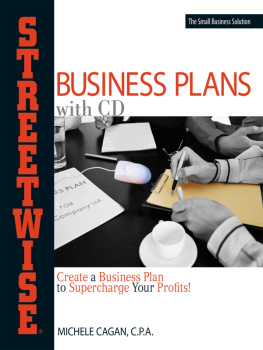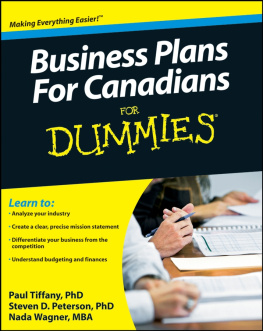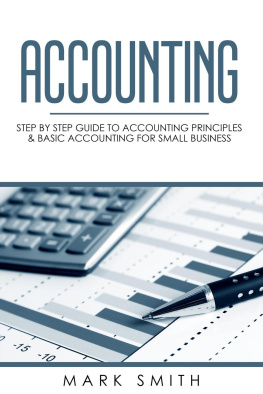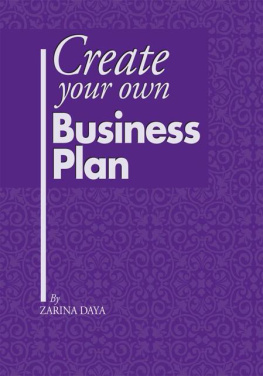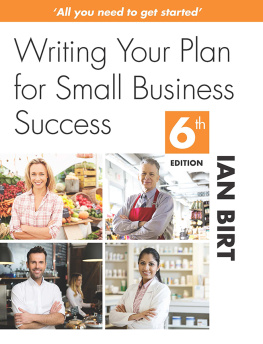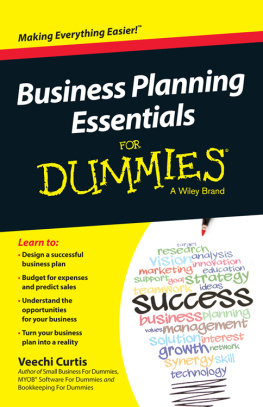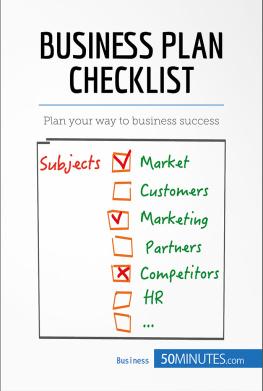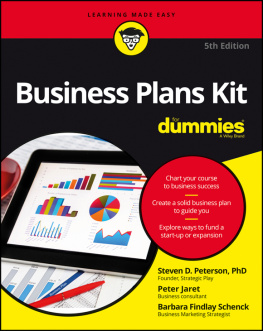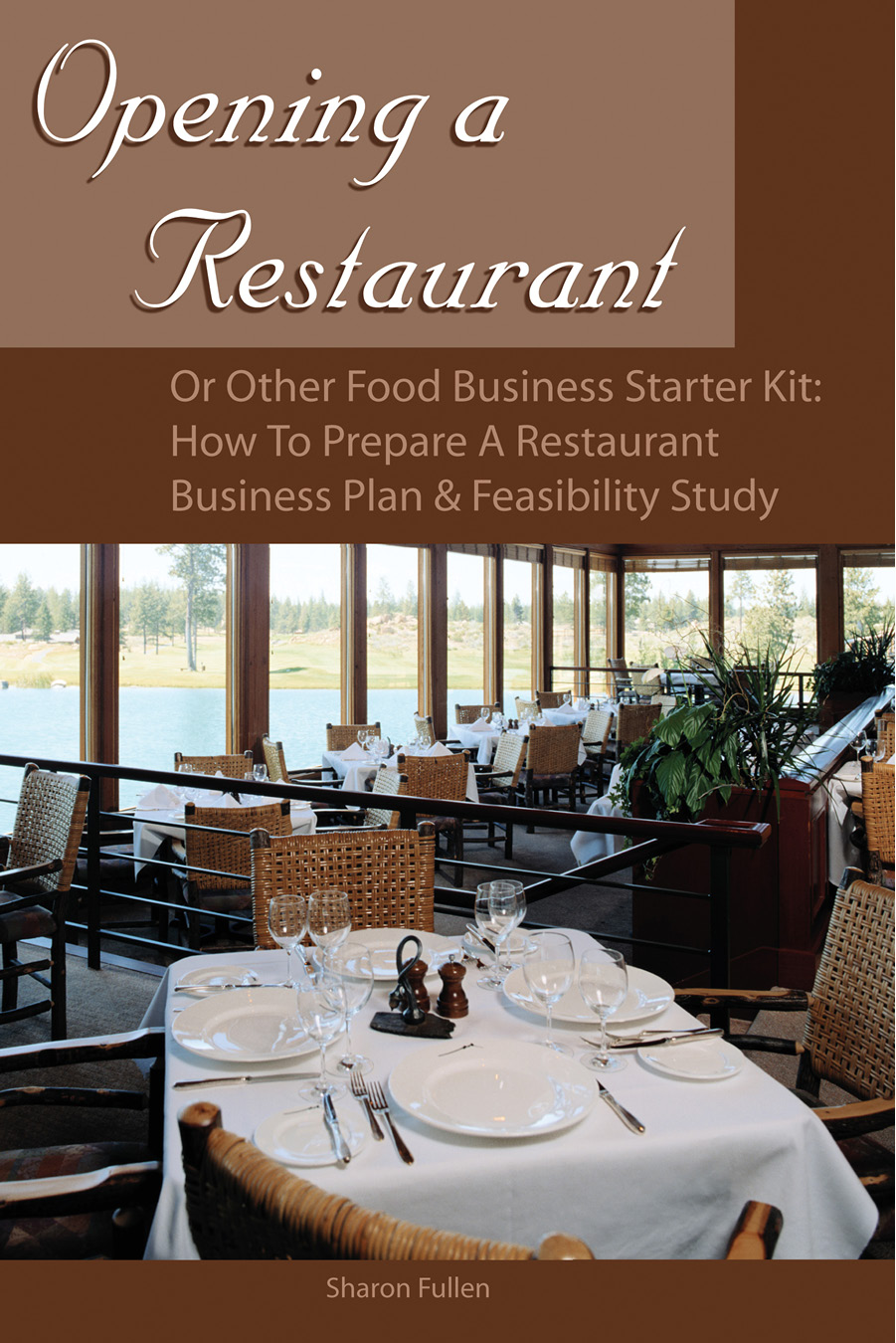Opening a Restaurant or Other Food Business Starter Kit
How to Prepare a Restaurant Business Plan & Feasibility Study
Sharon Fullen
Opening a Restaurant or Other Food Business Starter Kit: How to Prepare a Restaurant Business Plan & Feasibility Study
Atlantic Publishing Group, Inc. Copyright 2005
1405 SW 6th Avenue Ocala, Florida 34474
800-814-1132 352-622-1875Fax
www.atlantic-pub.com
SAN Number: 268-1250
All rights reserved. No patent liability is assumed with respect to the use of information contained herein. Although every precaution has been taken in the preparation of this book, the publisher and author assume no responsibility for errors or omissions. No warranty is implied. The information is provided on an as is basis.
International Standard Book Number: 0-910627-36-3
Library of Congress Cataloging-in-Publication Data
Fullen, Sharon L.
Opening a restaurant or other food business starter kit : how to prepare a restaurant business plan & feasibility study : with companion cd-rom / by Sharon Fullen.
p. cm.
Includes index.
ISBN 0-910627-36-3 (alk. paper)
1. Restaurant management.
2. New business enterprises--Management.
3. Small business--Management. I. Title.
TX911.3.M27F835 2004
647.95'068--dc22
2004022739
Introduction
Starting your own restaurant is an exciting adventure. Close your eyes and visualize how the dining room looks, lust for the latest cooking equipment, smell your signature dish and see the faces of happy customers. Now think about writing a business plan for your new restaurant. Jars your eyes open and makes you sweat, doesnt it? Take a deep breath, help is on the way. Opening a Restaurant or Other Food Business Starter Kit: How to Prepare a Restaurant Business Plan & Feasibility Study was written to give first-time entrepreneurs and seasoned restaurateurs the support and guidance they need to make their dreams a reality.
Youve taken a big first step by purchasing this book. Perhaps your banker or lender has told you that he MUST have a copy of your business plan or a friend suggested that you write a business plan. At this point, you may not actually know why you should bother. Just like writing a school paper, you probably are approaching this reluctantly. There are businesses that become successful without a business planbut significantly more fail to plan and then fail to succeed.
There is no magic wand you can wave to speed you through the tough aspects of launching and operating a food service establishment, but with good planning, you can minimize the pain and maximize the benefits. The goal of this book is to help you P.L.A.N.:
P repare for Success
L earn How to Be Profitable
A ct, Not React
N avigate Pitfalls
Your Elevator Pitch
Your elevator pitch, which should take about the length of an elevator ride to deliver, is a brief description that neatly sums up your business concept. It isnt just a lifeless declarationI want to start a Chinese restaurant; it is a statement that captures the excitement and potential of your ideaIm starting a trendy restaurant featuring exquisite dinners from every region of China. Ive hired a chef from a trendy New York establishment and renowned restaurant designer Barbara Lazaroff is working with us.
Imagine you were alone in an elevator with billionaire Donald Trump. Here is your chance to pitch your idea to him. Can you capture his attention, sell him on your idea and intrigue his entrepreneurial spirit before you reach the 22nd floor?
Your elevator pitch is also a useful tool that helps you focus on your goals. Youll find several ways to build upon your elevator pitch throughout the book. Now set aside some quiet time with a pad and paper (or make your notes right on these pages), and start the process of creating your own plan for success.
Chapter 1: What Is a Business Plan?
As you begin exploring the possibilities of opening a new restaurant or enhancing your current business, many ideas, emotions and dreams are bouncing around in your head. Should you do this or would that be better? So many things to think about, where do you start? The answers are within the entrepreneurs best guide and decision-making toolyour business plan!
I dont know too many people who are excited about the prospect of writing their business plan. It requires you to do extensive research, ask many questions, calculate current and future financial pictures and do some real soul searching. Nevertheless, the benefits are worth the effort. Once you get everything down on paper, Im confident youll be glad you invested the time to think through the good, bad and the ugly so that you can be prepared to handle a multitude of business situations. If your personal future and business success isnt worth the time and effort it takes to write your business planthen perhaps you should rethink whether you are ready to be a restaurant owner.
A business plan is a document where you:
1.Describe your new or existing business.
2.Define your customers needs and your ability to meet them.
3.Explore competitor strengths and weaknesses to outperform them.
4.Address possible stumbling blocks to success.
5.Establish yourself and your team as capable businesspeople and food artists.
6.Detail marketing strategies to capture your share of the market.
7.Set benchmarks and goals for launching, developing and profit making.
8.Provide financial projections and returns on investment.
9.Ask for money to support your success.
10.Tell investors and lenders whats in it for them.
In the following chapters, youll learn how to develop a plan that addresses all ten of these purposes.
Still panicked about writing a business plan? Remember that your plan is a collection of information and ideas based upon your knowledge, expertise, background and faith at that time. Your plan isnt a rigid set of rules to live by, but a powerful living guide. As you move through each stage of your business development, youll learn new facts and gain additional experience that may alter your path and goals.
Why Do I Need a Plan?
You need a Business Plan to explore your business ideas, determine their viability and secure money to make your ideas happen. Most people concentrate on the last reasonto get money. Their plan is then written solely to attract outside investors or satisfy lender requirements. If you are writing your plan primarily for them, you are at risk of slanting the truth and overlooking other areas that will benefit you.
How You Can Benefit
Researching and writing your business plan offers multiple benefits for new and experienced restaurant owners. The process of developing the plan helps you solidify your desires and set your professional goals. Writing your plan will:
1. Clarify your vision. Instead of just saying, Id like to own a restaurant, youll be creating a Technicolor version of your cozy little Italian deli or your sleek and sophisticated restaurant featuring live jazz.
2. Prove your potential. Youll prove to yourself and others that your community needs another steakhouse or tearoom. On the other hand, you may even discover that your idea isnt a viable one. Too much competition, wrong location, inadequate customer base or insufficient customer demand are all reasons to stop and reassess your ideas.
3. Look at obstacles. Every business venture will have obstacles. By looking at potential problems and outlining solutions, youll prepare yourself. Not all problem/solution scenarios will make it into your plan, but youll uncover many of them as you research your business prospects.


